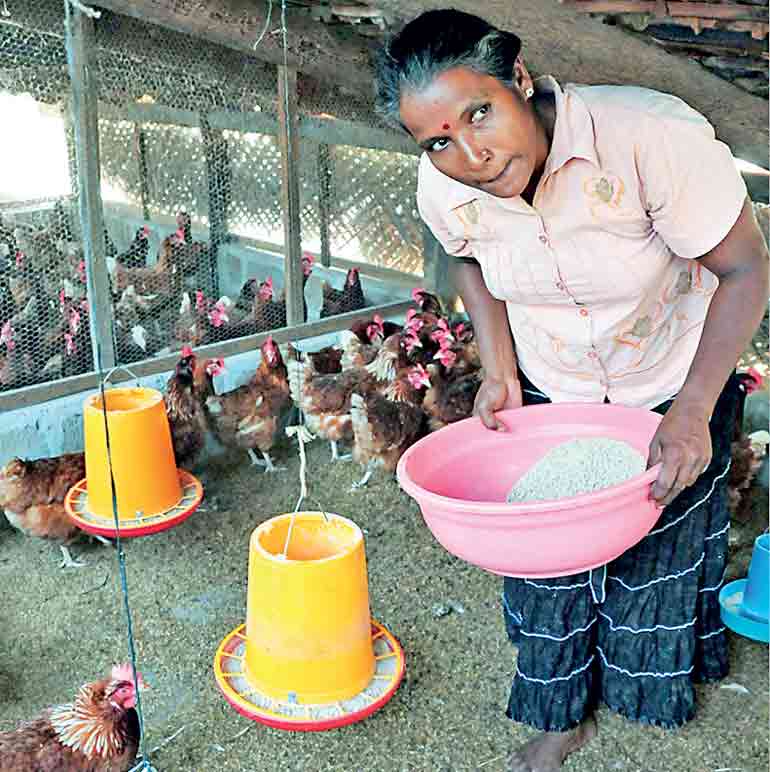Tuesday Feb 17, 2026
Tuesday Feb 17, 2026
Thursday, 20 November 2025 02:34 - - {{hitsCtrl.values.hits}}

 Sri Lanka’s poultry industry stands today as one of the most advanced agribusiness sectors in the country—technologically modern, fully self-sufficient, and supported by decades of investment in hatcheries, breeder farms, feed mills, broiler operations, and processing facilities. Yet in spite of this strength, the industry is stagnant. Much of the national capacity remains underutilised, profitability has weakened, and the sector is unable to expand into export markets.
Sri Lanka’s poultry industry stands today as one of the most advanced agribusiness sectors in the country—technologically modern, fully self-sufficient, and supported by decades of investment in hatcheries, breeder farms, feed mills, broiler operations, and processing facilities. Yet in spite of this strength, the industry is stagnant. Much of the national capacity remains underutilised, profitability has weakened, and the sector is unable to expand into export markets.
At the heart of this challenge is one critical factor: the cost of maize.
Maize accounts for more than 50% of broiler feed formulations, making it the single largest determinant of poultry production cost. Sri Lanka’s domestic maize production cost averages around Rs. 150 per kilogram, far above international levels. India, for instance, produces maize at around Rs. 50 per kilogram and exports to Sri Lanka at approximately Rs. 96 per kilogram inclusive of freight.
Despite these realities, imported maize (HS Code 1005.90.00) is subject to a Special Commodity Levy (SCL) of Rs.25 per kilogram. This levy artificially inflates feed prices, distorts the market, and undermines the competitiveness of the poultry industry. As a result, feed mills, breeder farms, and hatcheries across the country operate below capacity, while investors face shrinking returns.
Foreign exchange potential of a competitive poultry export industry
Although the industry has repeatedly brought this matter before the Department of Animal Production and Health and the Ministry of Agriculture, the Ministry of Finance has not yet recognised the foreign exchange potential of a competitive poultry export industry. Sri Lanka is unable to export broiler chicken because no bilateral agreements currently exist between Sri Lanka and importing countries’ food safety authorities. Discussions with Singapore and China are underway, but even if approvals are granted, high production costs will prevent Sri Lanka from competing globally.
The poultry industry is requesting the same treatment: remove the SCL on maize and bring both local and imported maize under the VAT system. With the VAT threshold now reduced to Rs. 36 million per annum, this shift would benefit stakeholders across the value chain. VAT is neutral and creditable, whereas SCL is a direct, non-recoverable cost that inflates production expenses
There is, however, a clear and economically sound solution: create a level playing field for maize.
Sri Lanka has already demonstrated the policy principle in other sectors. The Budget 2026 removed the SCL on coconut oil and made both imported and locally produced coconut oil liable for VAT and SSCL to eliminate market distortions. Similarly, VAT was applied to both imported and locally manufactured fabric to maintain fair competition.
The poultry industry is requesting the same treatment: remove the SCL on maize and bring both local and imported maize under the VAT system.
With the VAT threshold now reduced to Rs. 36 million per annum, this shift would benefit stakeholders across the value chain. VAT is neutral and creditable, whereas SCL is a direct, non-recoverable cost that inflates production expenses.
Removing the SCL would lower feed prices, reduce broiler production costs, stabilise the market, and create the conditions required to pursue export opportunities. It would also help reduce consumer prices for chicken and eggs, the most affordable sources of animal protein for Sri Lankan families.
Removing the SCL would lower feed prices, reduce broiler production costs, stabilise the market, and create the conditions required to pursue export opportunities. It would also help reduce consumer prices for chicken and eggs, the most affordable sources of animal protein for Sri Lankan families
Importation quota
Another critical barrier negatively affecting the poultry sector is the importation quota imposed on maize. At present, Sri Lanka does not permit free importation of maize, and import volumes are tightly controlled through quota-based approvals. These restrictions create an artificial shortage, elevate market prices, and allow room for manipulation within the value chain. The quota system also prevents feed mills from securing maize at globally competitive prices, forcing them to rely on limited domestic supply that is both insufficient and significantly more expensive.
For a sector where maize constitutes more than half of the broiler ration, such constraints directly translate into higher production costs, reduced competitiveness, and suppressed industry growth. Therefore, along with removing the Special Commodity Levy (SCL) and treating maize under the VAT system, it is essential that the Government relaxes import quotas and allows feed manufacturers to import maize freely, based on actual national demand. This policy reform would bring price stability, prevent artificial scarcity, and enable the poultry industry to operate at full capacity and pursue export opportunities.
Along with removing the Special Commodity Levy (SCL) and treating maize under the VAT system, it is essential that the Government relaxes import quotas and allows feed manufacturers to import maize freely, based on actual national demand. This policy reform would bring price stability, prevent artificial scarcity, and enable the poultry industry to operate at full capacity and pursue export opportunities
Sri Lanka’s poultry industry has the capacity, technology, and expertise to become a regional exporter of broiler meat and value-added poultry products. But without competitive maize pricing, the sector will remain trapped below its potential.
The time has come for Sri Lanka to make a strategic, forward-looking policy decision: treat maize not as a crop to be protected, but as a national competitiveness factor essential for food security, economic sustainability, and foreign exchange generation.
(The author holds MPF (UoK), ACA, ACMA, CGMA, CLSSBB.)
Sri Lanka’s poultry industry has the capacity, technology, and expertise to become a regional exporter of broiler meat and value-added poultry products. But without competitive maize pricing, the sector will remain trapped below its potential.The time has come for Sri Lanka to make a strategic, forward-looking policy decision: treat maize not as a crop to be protected, but as a national competitiveness factor essential for food security, economic sustainability, and foreign exchange generation